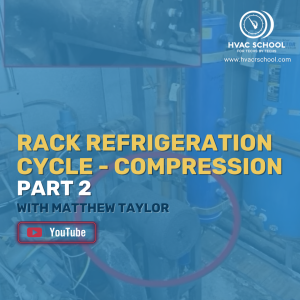BACK
 Field Guide to Crankcase Heaters
Field Guide to Crankcase Heaters
 Compressor Failure: Diagnosis and Replacement Checklist for Residential and Light Commercial Equipment
Compressor Failure: Diagnosis and Replacement Checklist for Residential and Light Commercial Equipment
 Léon Creux’s Scroll Design: From Initial Failure to an Enduring Legacy
Léon Creux’s Scroll Design: From Initial Failure to an Enduring Legacy
 Three Levels of Acid Testing
Three Levels of Acid Testing
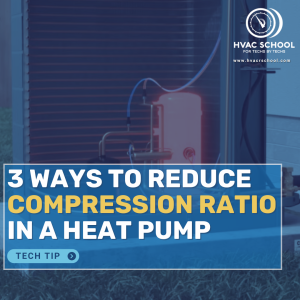 3 Ways to Reduce Compression Ratio in a Heat Pump
3 Ways to Reduce Compression Ratio in a Heat Pump
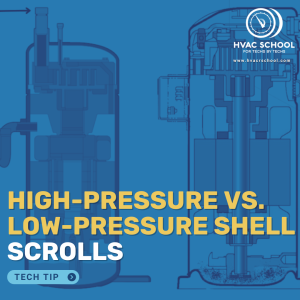 High-Pressure vs. Low-Pressure Shell Scrolls: A Deeper Dive
High-Pressure vs. Low-Pressure Shell Scrolls: A Deeper Dive
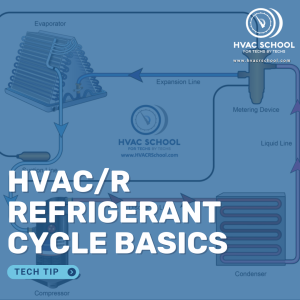 HVAC/R Refrigerant Cycle Basics
HVAC/R Refrigerant Cycle Basics
 Why Discharge Line Temperature is a Useful Reading
Why Discharge Line Temperature is a Useful Reading
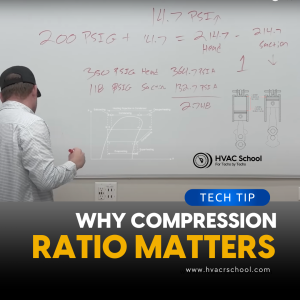 Why Compression Ratio Matters
Why Compression Ratio Matters
 Crankcase Heaters – Short #248
Crankcase Heaters – Short #248
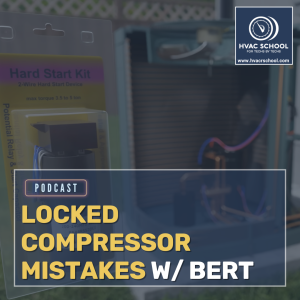 Locked Compressor Mistakes w/ Bert
Locked Compressor Mistakes w/ Bert
 Compressor Ohm Mistakes w/ Bert
Compressor Ohm Mistakes w/ Bert
 Preventing Slugging & Flooding w/ Copeland
Preventing Slugging & Flooding w/ Copeland
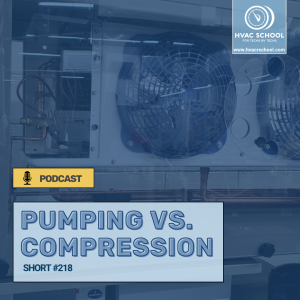 Pumping vs. Compression – Short #218
Pumping vs. Compression – Short #218
 Circuit Board Diagnosis Basics
Circuit Board Diagnosis Basics
 Cutting Compressors, iManifold, and Thermal Imaging w/ Ulises Palacios
Cutting Compressors, iManifold, and Thermal Imaging w/ Ulises Palacios
 The Basic Refrigeration Circuit
The Basic Refrigeration Circuit
 Diagnosing & Replacing a Compressor
Diagnosing & Replacing a Compressor
 How To Properly Inspect a Failed Compressor
How To Properly Inspect a Failed Compressor
 Compressor Teardown
Compressor Teardown
#compressor
Tech Tips:

Crankcase heaters are a critical but often overlooked component in air conditioning and refrigeration systems. Their function is simple but vital: to prevent liquid refrigerant from migrating into the compressor crankcase during the off-cycle. A missing or failed crankcase heater is a leading cause of premature compressor failure. This guide covers why they're necessary, how […]
Read more

Special thanks to Ty Branaman and Bert Testerman for their work and feedback on this tech tip about compressor failure diagnosis and replacement. A PDF checklist that covers all of the procedures in this tech tip can be found at http://www.hvacrschool.com/compressor-replacement-checklist. Important Note Before You Begin Industry data indicates that up to 30% of compressors […]
Read more

The HVAC/R industry isn’t short on tragic figures. There’s John Gorrie, whose ice machine showed a lot of promise but didn’t have enough financial backing due to the lucrative ice industry and the death of his business partner. While Gorrie may have died without seeing his vision reach the masses, he was ahead of his […]
Read more

Anytime we have a compressor failure, we can’t just pull out the bad compressor and drop a new one in. We have to put our detective hats on and find the culprit so that it doesn’t happen again. In many cases, acid is a prime suspect. Whenever there’s acid in the system, the next compressor […]
Read more

We’ve talked about compression ratio a lot over the years. Compression ratio is the number you get when you divide the absolute head pressure (PSIG + 14.7) by the absolute suction pressure (PSIG + 14.7). It measures the efficiency of a compressor, and lower numbers indicate that the compressor is moving more refrigerant while consuming […]
Read more

I want to share something that came up in a recent discussion with Roman Baugh about VRF systems, and it made me realize I might have had a blind spot regarding scroll compressor designs. We were talking specifics, and he brought up high-pressure shell compressors. My immediate thought was, “Hold on, aren't scrolls low-pressure shell […]
Read more

This is a basic overview of the HVAC/R refrigerant cycle (and refrigeration circuit) and how it works. It isn't a COMPLETE description by any means, but it is designed to assist a new technician or HVAC/R apprentice in understanding the fundamentals. First, let's address some areas of possible confusion: 1. The word “condenser” can mean […]
Read more

For this tech tip on discharge line temperature, I’d like to give special thanks to Roman Baugh for the section about compressor superheat. It’s not something we talk about very often outside of chiller and commercial refrigeration applications, but it definitely has value in the HVAC world as well. Thanks, Roman! Since I started in […]
Read more

In HVAC/R, we are in the business of moving BTUs of heat, and we move BTUs via pounds of refrigerant. The more pounds we move, the more BTUs we move. In a single-stage HVAC/R compressor, the compression chamber maintains the same volume no matter the compression ratio. The thing that changes is the number of […]
Read more
Videos:
Podcasts:

In this short podcast episode, Bryan talks about crankcase heaters, including their different types, what they do, and when we need to use them. Crankcase heaters usually come in belly band varieties, but some can be inserted into the sump of the compressor. As their name suggests, crankcase heaters heat the crankcase when the […]
Read more

In this informative HVAC podcast episode, Bryan and Bert dive deep into the complex world of locked and internal overload compressors, focusing specifically on single-phase residential units. The discussion begins with Bert explaining one of the most common challenges technicians face: diagnosing a locked compressor. He describes how compressors that are locked will typically […]
Read more

In this episode, Bryan and Bert dive into the often misunderstood world of compressor testing, focusing on common mistakes technicians make when using ohmmeters, compressor testers, and megohm meters. The conversation highlights how diagnostic errors can lead to unnecessarily condemned compressors and wasted time and resources. The hosts begin by discussing fundamental concepts like […]
Read more

In this episode of the HVAC School Podcast, host Bryan welcomes Jeff from Copeland to discuss the critical topic of flooding and slugging in compressors. Jeff, calling in from frigid Minnesota (at negative 19°F), explains the differences between these harmful conditions and how they can damage compressor systems. The conversation begins by differentiating between […]
Read more

In this short episode, Bryan clears up the confusion behind pumping vs. compression. Pumping is usually associated with liquid. Liquid, like vapor, is a fluid, but it's a lot denser and is essentially incompressible because the molecules are close together. Liquid volume varies based on temperature and density, but we can't squish the molecules […]
Read more

In this unedited episode of HVAC School, Bryan and Nathan talk about some basic rules for circuit board diagnosis. So, circuit boards are boards with circuits in them. They come in two types. The traditional printed variety contains switches, relays, and resistors. The other type contains silicon chips and uses logic and processing inside the […]
Read more

In this episode of HVAC School, Bryan talks with Ulises Palacios about some cool technology. Ulises has become a technology expert through his many years of working with new tools. He has recently been involved in testing new technologies, and he has worked with Jim Bergmann. Cutting open a compressor is one of the most […]
Read more

In this episode of HVAC School, we discuss the entire basic refrigerant/compression refrigeration circuit. We are in the business of moving heat. Heat refers to motion in the molecules. Temperature is the average velocity of those molecules. Heat needs a temperature differential to move. So, HVAC systems absorb heat when the refrigerant is colder than […]
Read more

In this podcast episode, Bryan goes over best practices for diagnosing and replacing an A/C or refrigeration compressor. When testing for a shorted compressor, make sure the compressor is isolated from all of its circuitry. You would see low ohms to ground in a shorted compressor. Do NOT measure from winding to winding or terminal […]
Read more
Events:

NOTE: If you cannot view the recording, the video may still be processing. The maximum wait time is 24 hours. We apologize for the delay and appreciate your patience.
Read more

NOTE: If you cannot view the recording, the video may still be processing. The maximum wait time is 24 hours. We apologize for the delay and appreciate your patience.
Read more








